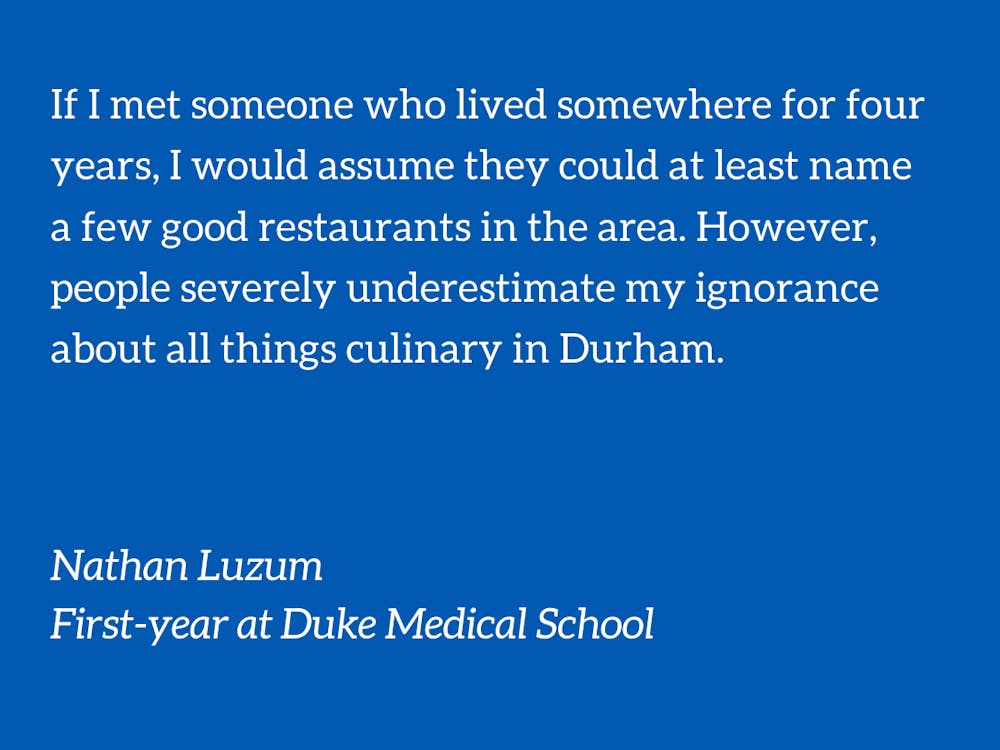When my medical school classmates hear that I went to Duke for undergrad, they assume I know a lot about Durham restaurants. This is a very fair assumption. If I met someone who lived somewhere for four years, I would assume they could at least name a few good restaurants in the area. However, people severely underestimate my ignorance about all things culinary in Durham.
This guide is for people like me, those who are expected to know something about area eateries but simply don’t.
Option 1: Stall the conversation as you pull out your phone to secretly Google “best Durham restaurants.”
A classic, tried-and-true way to give recommendations about anything is to rely on the opinions of strangers on the internet and the algorithms of a trillion-dollar company. To successfully employ this strategy, first buy yourself some time by explaining that Duke undergrads are forced to live on campus for three years (and most do so for four), which makes you seem somewhat less ignorant.
As you keep making excuses for your lack of ability to name at least a single eating establishment in Durham, your conversational companion will begin to look away and scan the room for someone more interesting to talk to, which at this point is anyone but you. Now is the perfect time to take out your phone and do a quick search. Pick the top result and read Google’s description verbatim. After you say “Gocciolina is actually pretty good—Italian pasta dishes and small plates are featured at this cozy strip mall venue, plus beer and wine,” people will be stunned at your intimate knowledge of Durham restaurants. In the event of a follow-up question, simply read the first Yelp review that pops up and hope that answers the question.
Option 2: Recommend a chain restaurant for a cheap laugh.
Saying that Chipotle is your favorite Durham restaurant is a sure way to cement your reputation as that sorta funny person who can make one or two decent jokes per conversation. And if you go with slightly less obvious chains like Mellow Mushroom or Bojangles, you might actually convince people that you’re capable of naming at least one local eatery.
For me, at least, this answer also has the benefit of being somewhat true. My family is the type of family to fly to San Antonio for vacation and then get Panera for lunch followed by Subway for dinner. Perhaps there’s something wrong with this, but I enjoy the consistency of walking into a restaurant and knowing exactly what I want every time.
Option 3: Frantically look for any nearby advertisements bearing the name of something that could be a restaurant.
The success of this strategy is very much dependent on where your conversation is taking place. If you’re indoors in a classroom, this probably isn’t the best move. But if you’re strolling along the sidewalk or have a nice view of the outside, you just might catch a glimpse of a restaurant advertising on the side of a bus or billboard, in which case you’ll make sure those advertising fees were money well spent.
Of course, this option runs the risk of recommending an establishment that sounds like a restaurant but is not in fact a restaurant, which would be awkward for everyone. But then again, I thought Jiffy Lube was a fast-food place until middle school, when I walked by a Jiffy Lube and realized it was actually a shop for cars. Maybe your conversational companion will have a similar epiphany if your recommendation really wasn’t a restaurant, and you’ll be able to share a laugh over it later.
Option 4: Fabricate a restaurant name and hope no one fact-checks you.
Pick a fun name like “Pete’s Paninis” and wax poetic about how influential this eating establishment was during your undergrad experience. You can talk about how great the paninis were, how nice Pete was and anything else you think makes the story sound somewhat believable. You can even pull out your phone and show a photo of you and an older male relative, explaining that the man in the picture is Pete himself.
If the person you’re talking to is a killjoy and uses the internet to discover that the closest thing to Pete’s Paninis is some shop in Alabama, then your act is up. The best way to recover from this devastating blow is to act shocked that your favorite Durham restaurant went out of business and hold back tears. Then, you can gracefully exit the conversation by explaining you need to call your undergrad friend and tell them the unfortunate news.
Option 5: Just tell the truth.
This last option requires frightening levels of honesty and vulnerability: admitting that you really don’t know any good Durham restaurants because you had food points and ate on campus. Or that if you did go off campus, it was to a chain restaurant where you weren’t confronted with the scary novelty of an unknown menu.
Confronting the fact that I went to Duke for four years and tried very few off-campus restaurants made me feel a little like a fraud. But I would have felt even more like a fraud if I pretended to be a food expert. If we’re trying to squeeze an inspirational lesson out of this column, maybe it’s that people didn’t care all that much when I said I honestly couldn’t recommend a restaurant.
Nathan Luzum is a first-year medical student. His column runs on alternate Thursdays.
Get The Chronicle straight to your inbox
Signup for our weekly newsletter. Cancel at any time.

